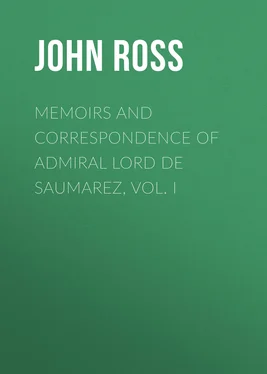John Ross - Memoirs and Correspondence of Admiral Lord de Saumarez, Vol. I
Здесь есть возможность читать онлайн «John Ross - Memoirs and Correspondence of Admiral Lord de Saumarez, Vol. I» — ознакомительный отрывок электронной книги совершенно бесплатно, а после прочтения отрывка купить полную версию. В некоторых случаях можно слушать аудио, скачать через торрент в формате fb2 и присутствует краткое содержание. Жанр: foreign_prose, foreign_antique, на английском языке. Описание произведения, (предисловие) а так же отзывы посетителей доступны на портале библиотеки ЛибКат.
- Название:Memoirs and Correspondence of Admiral Lord de Saumarez, Vol. I
- Автор:
- Жанр:
- Год:неизвестен
- ISBN:нет данных
- Рейтинг книги:3 / 5. Голосов: 1
-
Избранное:Добавить в избранное
- Отзывы:
-
Ваша оценка:
- 60
- 1
- 2
- 3
- 4
- 5
Memoirs and Correspondence of Admiral Lord de Saumarez, Vol. I: краткое содержание, описание и аннотация
Предлагаем к чтению аннотацию, описание, краткое содержание или предисловие (зависит от того, что написал сам автор книги «Memoirs and Correspondence of Admiral Lord de Saumarez, Vol. I»). Если вы не нашли необходимую информацию о книге — напишите в комментариях, мы постараемся отыскать её.
Memoirs and Correspondence of Admiral Lord de Saumarez, Vol. I — читать онлайн ознакомительный отрывок
Ниже представлен текст книги, разбитый по страницам. Система сохранения места последней прочитанной страницы, позволяет с удобством читать онлайн бесплатно книгу «Memoirs and Correspondence of Admiral Lord de Saumarez, Vol. I», без необходимости каждый раз заново искать на чём Вы остановились. Поставьте закладку, и сможете в любой момент перейти на страницу, на которой закончили чтение.
Интервал:
Закладка:
The officers and seamen, being now no longer wanted, were ordered a passage home in the Leviathan of fifty guns, on board which ship Lieutenant Saumarez embarked, in company with Captains Dalrymple, Smith, Hudson, Brisbane, Symons, and Græme, whose ships had also been destroyed. As she was approaching the English Channel, the Leviathan was overtaken by a violent storm, and most providentially saved from shipwreck by the clearing up of a thick fog just in time to avoid the danger, when they found the ship close to the Rocks of Scilly, near to the spot where Sir Cloudesley Shovel was lost. This circumstance has been attributed to a strong northerly current, but it was probably from the position of these dangerous islands being inaccurately laid down in the charts; it is indeed an extraordinary fact, that an error of no less than three leagues in their situation was first discovered by the Swedish surveyor, Nordenanker, about the commencement of last war. The Leviathan, nevertheless, arrived safely at Portsmouth about the beginning of the year 1779, when Lieutenant Saumarez had again an opportunity of visiting his family and friends in Guernsey.
He had, however, resided there but a short time, when he was appointed first lieutenant of the Edgar of seventy-four guns, then fitting at Woolwich for the broad pendant of Commodore Elliot. After receiving his letter of appointment, he was obliged to wait some time for an opportunity to cross the channel; but at length availed himself of the Ambuscade, which touched at Guernsey. Having arrived at the Isle of Wight, Captain Phipps, her commander, ascertained that the squadron under Admiral Drake, to which he belonged, had sailed from Spithead; therefore without touching at Portsmouth to land Lieutenant Saumarez, he proceeded to join the Channel fleet, which he found twenty leagues to the westward of Scilly, having on the way retaken the Helena sloop of war; to command which Sir John Warren, then first lieutenant of the Victory, was appointed, and Mr. Saumarez was ordered in his stead to join the Victory, then bearing the flag of Sir Charles Hardy, at whose request he was continued in that ship, where he was third lieutenant in seniority, but supernumerary on the books. Besides the commander-in-chief of the Channel fleet, Rear-Admiral Kempenfelt, as first, and Captain Collings, as second captain, were both on board the Victory detached to cruise off Brest, commencing in June 1779, and returning occasionally to port until May 31st, 1780. After the death of Sir Charles Hardy, which took place on the 9th May 1780, Admiral Geary, and then Sir Francis Drake, succeeded to the command, with Captain Clayton as captain.
The Victory continued on the same service until the spring of 1781, when Admiral Hyde Parker hoisted his flag, and Mr. Saumarez now became first lieutenant. He had been so zealously attentive to his duty, that for several months he never went on shore, till at length he yielded to the persuasion of his messmates. On arriving at Point Beach, Portsmouth, he was accosted by a person in French, who demanded the way to the admiral's house, and at the same time informed him that he had just landed with the intelligence that Jersey had been attacked by the French. Mr. Saumarez immediately went with the messenger to the admiral, who despatched him as a courier to town, and he returned in a remarkably short time with orders respecting it. In short, his diligence and zeal were so manifest in every service on which he was employed, that he soon gained the esteem and friendship of Vice-admiral Hyde Parker, who, in June 1781, was appointed to the command in the North Seas, and shifted his flag into the Fortitude, Captain Robertson. The squadron in those seas, when under command of Commodore Keith Stewart, was of inconsiderable strength, but had now risen to a force of five ships of the line, besides one fifty, one forty-four, and three frigates. Notwithstanding the desire of Lord Sandwich, then first lord of the admiralty, to provide for his own friends, the admiral succeeded in carrying with him, from the Victory, Lieutenants Waghorne and Saumarez. On the 3rd of June they sailed from Spithead to Sheerness, and, after refitting and touching at Leith, sailed to bring home the Baltic convoy from Elsineur, about the beginning of July.
The squadron, which might have been made much stronger, consisted of the Fortitude, seventy-four, Captain Robertson; the Princess Amelia, eighty, Captain Macartney; the Berwick, seventy-four, Captain Fergusson; the Bienfaisant, sixty-four, Captain Braithwaite; the Buffalo, sixty, Captain Truscott; the Preston, fifty, Captain Græme; the Dolphin, forty-four, Captain Blair; the Latona, thirty-eight, Sir Hyde Parker (the admiral's son); the Belle Poule, thirty-six, Captain Patton; the Cleopatra, thirty-two, Captain Murray; and the Surprise, cutter, Lieutenant Rivett.
The Dutch by this time had declared war, and, being perfectly aware of the force of Admiral Parker's squadron, sailed with a large convoy for the Baltic, under command of Admiral Zoutman, whose squadron was one ship of the line superior; it became, therefore, necessary to take the Dolphin, of forty-four guns, into the line, although she had only eighteen-pounders on the lower deck.
But before entering into the details of the action which took place on the 5th of August 1781, it is proper to give some of the particulars of each squadron. That of Admiral Parker was totally unfit for the line of battle; the ships had been but a short time together, and had only two or three times practised the usual manœuvres of forming the line, &c. The Fortitude was a small seventy-four, but well manned. The Princess Amelia was an old eighty-gun ship, with reduced metal and masts. The Berwick was a good ship, and, in addition to her metal, had two sixty-eight-pounder carronades on the poop; but next to her was the Dolphin, forty-four, with only twenty twelve-pounders on the lower-deck, which could not be expected to make any impression on a sixty-four. The Buffalo was formerly the Captain, of seventy guns; but, in the commencement of hostilities, not being thought efficient as a ship of war, she was fitted up as a mast-ship and her name changed; but, probably for want of vessels, she was again equipped for war with sixty guns, but only with eighteen-pounders on the lower deck. The Preston was a good fifty-gun ship, with her proper metal, twenty-four-pounders on the lower, and twelve-pounders on the upper deck. The Bienfaisant had the metal on her lower deck reduced. The Artois, which afterwards joined the squadron, was the finest frigate then known; had twenty-eight, eighteen-pounders on her main deck, with, in addition to her complement of guns, heavy carronades on the quarter-deck and forecastle; she was manned with three hundred men. The Latona was a fine thirty-eight gun frigate, with eighteen-pounders; the Belle Poule and Tartar were excellent of their class.
The Dutch squadron consisted of one seventy-four, one sixty-eight, one sixty-four, and five fifty-fours. In the action there were five frigates, the other five having gone off with the convoy; the list of both will be found in the Appendix to this volume, with that of the killed and wounded.
The Dutch squadron and convoy, which were bound to the Baltic, were discovered at four o'clock in the morning about six leagues to leeward; and there being a fine commanding breeze and smooth water, everything was favourable, as well for detaching the convoy, which was immediately done by signal to the Tartar, as for making dispositions to attack the enemy. The admiral seeing that they had their own port (the Texel) directly to leeward, and being doubtful that they would run in there for shelter, or at least go nearer to the shore, made the signal to chase at thirty-five minutes past four, which obliged every ship to make sail instead of preparing for action with a superior enemy. At five, Admiral Zoutman hoisted Dutch colours, and his men-of-war drew out from the convoy, which took their station under the lee to await the event. At half-past five, the admiral made the Tartar's signal to stay by, and part company with the convoy, which then hauled their wind, made sail to the south-west, and was soon out of sight and danger.
Читать дальшеИнтервал:
Закладка:
Похожие книги на «Memoirs and Correspondence of Admiral Lord de Saumarez, Vol. I»
Представляем Вашему вниманию похожие книги на «Memoirs and Correspondence of Admiral Lord de Saumarez, Vol. I» списком для выбора. Мы отобрали схожую по названию и смыслу литературу в надежде предоставить читателям больше вариантов отыскать новые, интересные, ещё непрочитанные произведения.
Обсуждение, отзывы о книге «Memoirs and Correspondence of Admiral Lord de Saumarez, Vol. I» и просто собственные мнения читателей. Оставьте ваши комментарии, напишите, что Вы думаете о произведении, его смысле или главных героях. Укажите что конкретно понравилось, а что нет, и почему Вы так считаете.












